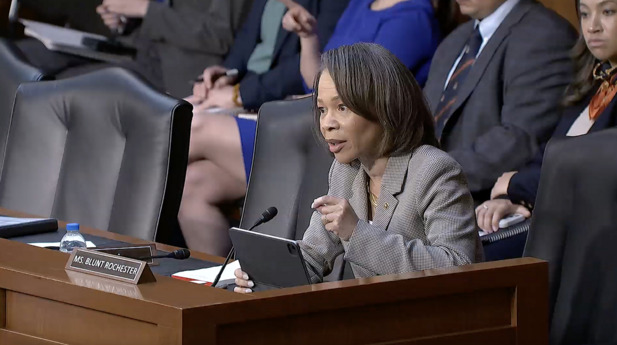May 8, 2025

The Senator’s full exchange with the witnesses can be found here.
Washington, DC – Today, Senator Lisa Blunt Rochester (D-Del.) questioned OpenAI CEO Sam Altman during the Senate Committee on Commerce, Science, and Transportation’s full committee hearing titled “Winning the AI Race: Strengthening U.S. Capabilities in Computing and Innovation.” During her line of questioning, the Senator asked Sam Altman about OpenAI’s organizational changes, commitment to using AI responsibly, and honoring the statements laid out in their charter.
Senator Lisa Blunt Rochester: “Thank you, Chairman Cruz, and thank you so much to the witnesses. This is such an important hearing. Five minutes will not suffice for me. I’ll be submitting some questions for the record. I noticed that for Mr. Altman and Mr. Smith – when the question of ‘paint me a picture of the future’ came up, you actually leaned up in your chair. There was a level of excitement, and that’s how I am about the future. When I came into the House of Representatives in 2017, and I started a Future of Work, bipartisan caucus – I had a concern that number one, there were certain groups of people that were going to be left behind. But there was also, as a country, that we could be left behind.
“I had an event where we started and had everyone walk into the room and use a word cloud and tell me, ‘What do you think of when you think of the future of work?’ The biggest word coming in the door was ‘fear.’ The biggest word walking out the door was ‘opportunity.’ And so, to me, this conversation is so vital to think about the opportunities but also making sure that we are watching out for ethics, watching out for scams, watching out that technology does not take over the human [race]. So, I am just grateful for the conversation.
“And Mr. Altman, I listened to an interview that you gave with Lester Holt maybe a year or so ago and you talked in that interview about how OpenAI wasn’t initially even about making a product. It wasn’t about the money. And I know you are incorporated in Delaware, and I understand you have been working with our Attorney General during its previously proposed transition to for-profit. This Monday, OpenAI decided to apply to become a Public Benefit Corporation instead, and to have that PBC governed by your nonprofit arm. What went into this decision and what considerations influenced the timing of the organizational change?”
Mr. Altman: “So, we never… Thank you for the question senator and the chance to explain this it’s a complicated thing that I think has gotten misrepresented, so this is a wonderful forum to talk about it. We never planned to have the nonprofit convert into anything. The nonprofit was always going to be the nonprofit. And we also planned for a PBC from the very beginning. There were a bunch of other considerations about is it the PBC board that would control the nonprofit somehow or how our capital structure was going to work that there was a lot of speculation on, most of it inaccurate, in the press, but our plan has always been to have a robust nonprofit we hope our nonprofit will be one of the best, maybe someday the best resource nonprofit in the world, and a PBC with the same mission that would make it possible for us to raise the capital needed to deliver these tools and services at the quality level and availability level that people want to use them at, but still stick to our mission which we’ve been proud over the last almost decade of our progress toward. So, we had a lot of productive conversations with a lot of stakeholders and a lot of lawyers and a lot of regulators about the best way to do this. It took longer than we thought it was going to, you know I would’ve guessed that we would have been talking about this last year, but now we have a proposal that people seem pretty excited about we’re trying to now advance.”
The Senator also asked panelists about the best policies for semiconductor and chip manufacturing as they are key to AI advancement, and the state of AI cybersecurity in the United States.
###
Senator Lisa Blunt Rochester represents Delaware in the United States Senate where she serves on the Committees on Banking, Housing, and Urban Affairs; Commerce, Science, and Transportation; Environment and Public Works; and Health, Education, Labor, and Pensions.
